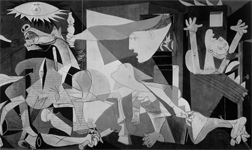I dreamed of the day when computer games would be a viable medium of artistic expression — an art form. I dreamed of computer games expressing the full breadth of human experience and emotion. I dreamed of computer games that were tragedies, games about duty and honor, self-sacrifice and patriotism. I dreamed of satirical games and political games; games about the passionate love between a boy and girl, and the serene and mature love of a husband and wife of decades; games about a boy becoming a man, and a man realizing that he is no longer young. I dreamed of games about a man facing truth on a dusty main street at high noon, and a boy and his dog, and a prostitute with a heart of gold (Chris Crawford, On Game Design).
I’m Available to Give Talks on Interactive Media and Videogames
If you are an educator, and would be interested in having me give a talk, guest lecture, or lead a workshop over Zoom, please don’t hesitate to reach out. I am also available for curriculum consultation, and advisory committee work. I love connecting with faculty and students, discussing art and design, and challenging peoples’ assumptions about videogames.
I have experience giving presentations and talks at universities, high schools, and places like IndieCade and Google; I have also created, taught, and served as advisor for a variety of classes at the university and high school levels. Learn more here
You can contact me by email at , or shoot me a message on Twitter.
About Me
 I am a tall person. Tall enough that I probably see the world from a slightly different vantage point than you do: I interact with the tops of refrigerators, high corner cabinets, and too-low ceilings. My heritage is Scandinavian, so I suppose that’s where I get my height, along with my pale skin, blue eyes, and red beard. I fit in well in Minnesota where I attended college, but I always feel that I shouldn’t, because my insides are filled with North African chili peppers: my father is an anthropologist, so I grew up in the rolling sand dunes of Tunisia and Egypt. My body is addicted to spicy hot food, which makes me happy, and high.
I am a tall person. Tall enough that I probably see the world from a slightly different vantage point than you do: I interact with the tops of refrigerators, high corner cabinets, and too-low ceilings. My heritage is Scandinavian, so I suppose that’s where I get my height, along with my pale skin, blue eyes, and red beard. I fit in well in Minnesota where I attended college, but I always feel that I shouldn’t, because my insides are filled with North African chili peppers: my father is an anthropologist, so I grew up in the rolling sand dunes of Tunisia and Egypt. My body is addicted to spicy hot food, which makes me happy, and high.Computer Games and Me
Why are we playing computer games, if not in hope of beauty laid bare, life heightened and its deepest mystery probed? Can the interactive artist isolate and vivify all in experience that most deeply engages our intellects and our hearts? Can the programmer-creator renew our hope for the interactive medium? Why are we playing computer games if not in hope that the creator will magnify and dramatize our days, will illuminate and inspire us with wisdom, courage, and the possibility of meaningfulness, and will press upon our minds the deepest mysteries, so we may feel again their majesty and power? (Adapted from Annie Dillard’s The Writing Life.)
 So I am more interested than ever in computer games. I’m interested in the "games as art" discussion, but more than that I am interested in the potential for games to make us, in Roger Ebert’s words, "more complex, thoughtful, insightful, witty, empathetic, intelligent, philosophical, and so on" (in other words, I am interested mainly in a particular definition of art, and how games relate to that definition). Which isn’t to say that I don’t also happily play games for fun… just that that isn’t my main reason for playing; most good games end up being "merely" fun (so I better enjoy them for that), but I play them in the hopes of discovering something more.
So I am more interested than ever in computer games. I’m interested in the "games as art" discussion, but more than that I am interested in the potential for games to make us, in Roger Ebert’s words, "more complex, thoughtful, insightful, witty, empathetic, intelligent, philosophical, and so on" (in other words, I am interested mainly in a particular definition of art, and how games relate to that definition). Which isn’t to say that I don’t also happily play games for fun… just that that isn’t my main reason for playing; most good games end up being "merely" fun (so I better enjoy them for that), but I play them in the hopes of discovering something more. The Purpose of this Website
Necessary Games
A work of art is good if it has arisen out of necessity. That is the only way one can judge it.
(Rilke, Letters to a Young Poet).
 Obviously both these definitions are somewhat fuzzy and pretentious: what the heck does it mean for something to be necessary to understanding the human experience? But I am speaking in terms of asymptotes and ideals: whether a game fits the above definitions of necessary is of course a matter of discussion, and can never be determined scientifically.
Obviously both these definitions are somewhat fuzzy and pretentious: what the heck does it mean for something to be necessary to understanding the human experience? But I am speaking in terms of asymptotes and ideals: whether a game fits the above definitions of necessary is of course a matter of discussion, and can never be determined scientifically.Contact
You can contact me at , or shoot me a message on Twitter.
Contributing Editors
 Yan Zhang enjoys all games, from mathematics and Street Fighter to social dynamics and foosball. He believes the most important liquids in the world are water, rooibos, protein shakes, green tea, and Guiness, in that order. He is a born-again Bostonian. His other blogs are Concrete Nonsense and Blue Slate. You can contact Yan at .
Yan Zhang enjoys all games, from mathematics and Street Fighter to social dynamics and foosball. He believes the most important liquids in the world are water, rooibos, protein shakes, green tea, and Guiness, in that order. He is a born-again Bostonian. His other blogs are Concrete Nonsense and Blue Slate. You can contact Yan at .
 Chris Tompkins doesn’t like modern videogames, players, or designers. He is often found on his digital lawn yelling at kids to get off his interwebs or telling long, rambling stories about his pixilated past. You can find Chris online at constantwanderer.com, and you can contact him at .
Chris Tompkins doesn’t like modern videogames, players, or designers. He is often found on his digital lawn yelling at kids to get off his interwebs or telling long, rambling stories about his pixilated past. You can find Chris online at constantwanderer.com, and you can contact him at .
If you are interested in contributing to Necessary Games, please send me an email.
